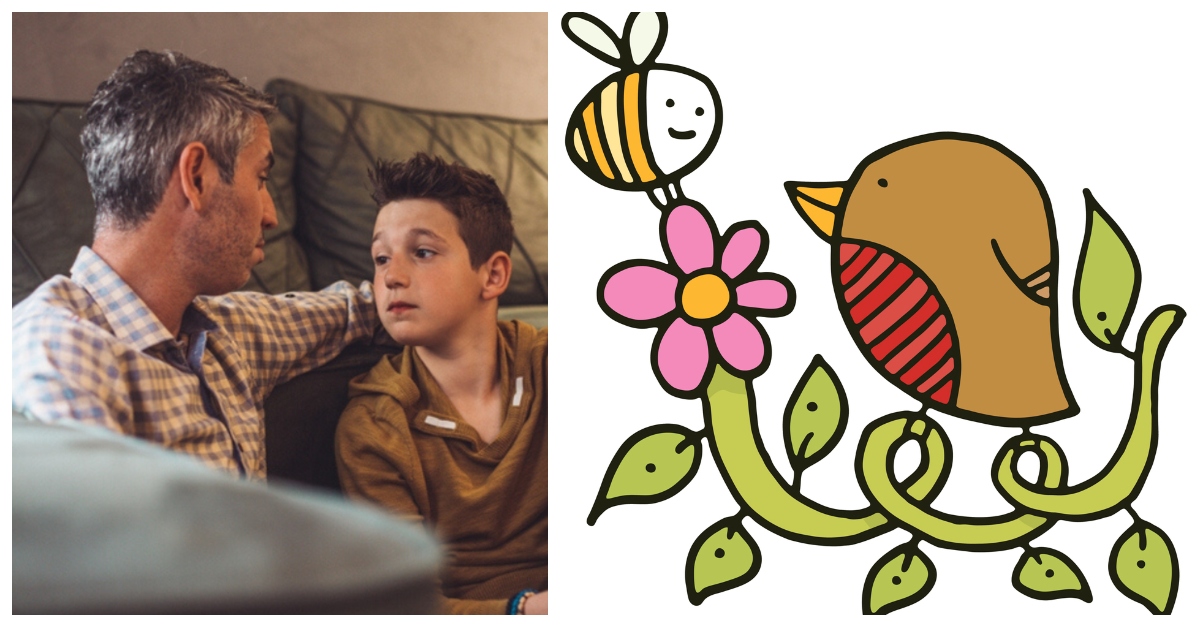
It's no secret that most parents are not finding homeschooling to be a walk in the park. For one thing, they've changed the way math is taught about four times since we were last in school. There's also the fact that technology has complicated things we once used to work out with pens and paper. Many parents are finding that they could use some refresher courses as they try to navigate distance learning for their kids. For parents of children of a certain age, there's another subject they're being asked to broach. Many parents are tackling the responsibility of teaching their kids sex education while homeschooling.
Yup, that's right. It's every awkward sitcom birds-and-bees moment you've ever seen, all rolled into your own personal nightmare. While parents are definitely more open about matters of sex and gender with their kids than ever before, it's still awkward for all parties involved.
May is Sex Ed For All month, and it's never felt quite as relevant as it does this year. With many kids continuing distance learning, parents are having to step in to teach their kids sex education. It makes for an awkward, sometimes funny, sometimes refreshing experience.
Some parents would do just about anything to get out of this. You can be sex-positive and also be mortified to have these conversations with your kids. One parent joked about bribing teachers to take care of it.
While you might think teachers are happy to pass on this experience, it's largely the opposite. One teacher expressed why it's a fascinating thing to teach.
"The last 6 wks are when we tackle the sex Ed part of the health curriculum. One of my fave things to teach -not just b/c the kids are quiet and usually cringing- but b/c they’re 100% genuinely interested in the changes they’re going through," one teacher tweeted.
The teacher went on to explain that to develop her teaching style, she thought back to what was missing in her own sex education experience. Instead of lecturing from a textbook, she takes a more open approach:
"They can sit quietly if they want to, but they usually talk in sm. groups with their peers; not just listening to me yapping at the front of the room. We look at sex in advertising and discuss myths. We talk about all varieties of relationships and most importantly, respect."
Other teachers are concerned that kids won't get the education they need at home. Many parents object to sex education due to religious or moral beliefs. Distance learning will allow parents to be in control of how — or if at all — to present this information to their kids.
To be fair, most of the kids aren't too thrilled about it, either. "I just told my son he has the choice between physical education or sex education for the next half hour," one mom tweeted. "He's out on the trampoline."
Most parents are grinning and bearing it. Admittedly, some of their stories are pretty hilarious. It's a little funny watching your kids squirm, but the goal is to get them more comfortable having open and honest conversations with you while also providing the educational basis they need to make good choices.
If you're one of the parents who is going to be broaching the subject, it's best to have some good resources to back you up. Thankfully, there's AMAZE, which offers resources scaled by your child's age.
The organization's mission reads: "AMAZE harnesses the power of digital media to provide young adolescents around the globe with medically accurate, age-appropriate, affirming, and honest sex education they can access directly online — regardless of where they live or what school they attend.
"AMAZE also strives to assist adults — parents, guardians, educators, and health care providers around the globe — to communicate effectively and honestly about sex and sexuality with the children and adolescents in their lives."
Amaze Jr. makes content that's geared toward children between the ages of 4 and 9. AMAZE provides content for ages 10 and up. Its most recent campaign, #TimeToTalk, deals with the big questions little kids ask as they start getting older.
There's also Sex Positive Families, a site that provides parents and caring adults with the education, resources, and support to raise sexually healthy children using a shame-free, comprehensive, and pleasure-positive approach. Sex Positive Families has compiled a number of resources for homeschooling families.
It offers an online workshop titled "Growing Into You! (Virtual) Puberty Workshop." This workshop is designed for tweens ages 8 to 12 of all gender identities. Accompanied by an adult parent or caregiver, kids learn in the company of peers to break down the taboos of puberty and reinforce the power of family and friend support systems.
Teaching your child sexual education may seem overwhelming, but it can also be the start of something really important and special. Not many kids feel comfortable being open with their families about sex, which leads to a lot of unnecessary confusion and shame. By opening up the conversation with your children in a nonjudgmental and informative manner, you're letting them know they are safe discussing the bigger issues in life with you.







